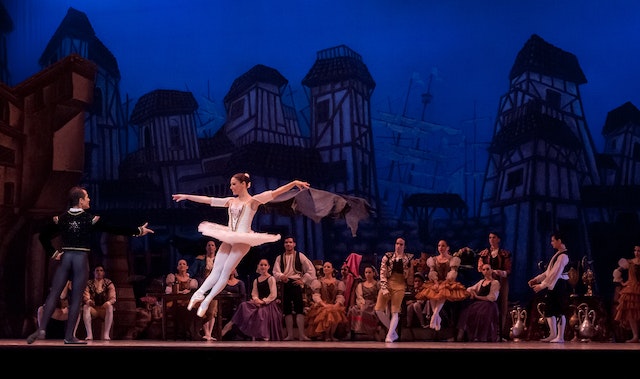Performing arts programs offer aspiring artists a platform to hone their skills, express their creativity, and pursue their passion for various forms of artistic expression. These programs provide a structured environment where students can learn from experienced professionals, collaborate with peers, and showcase their talents to a wider audience.
Whether you’re interested in acting, dance, music, or any other performing arts discipline, enrolling in a reputable program can be a significant step toward achieving your career goals.
Actor/Actress
One of the most sought-after careers in the performing arts industry is that of an actor or actress. Actors bring characters to life on stage, in film, and on television, captivating audiences with their performances. To succeed in this competitive field, aspiring actors often pursue formal training through performing arts programs that offer courses in acting techniques, voice projection, movement, and improvisation.
Dancer
Dancers use their bodies as instruments of expression, conveying emotions and storytelling through movement. Whether it’s ballet, contemporary, hip-hop, or jazz, dancers undergo rigorous training to develop their technique, strength, and flexibility.
Performing arts programs specializing in dance provide students with opportunities to refine their skills, explore different styles, and choreograph performances that showcase their artistic abilities.
Musician
Musicians play a vital role in the performing arts, creating soundscapes that enhance theatrical productions, dance performances, and concerts. Whether you’re a vocalist, instrumentalist, or composer, pursuing a music program can help you cultivate your talent, improve your musicality, and collaborate with fellow musicians. From classical to contemporary genres, music programs offer a diverse range of opportunities for aspiring artists to develop their craft.
Director
Directors are the visionaries behind the scenes, shaping the artistic direction of production and guiding performers to bring their characters to life. Through performing arts programs focused on directing, aspiring directors learn about script analysis, staging techniques, blocking, and collaboration with actors and designers. By honing their storytelling skills and creative vision, directors play a crucial role in bringing theatrical productions to fruition.
Choreographer
Choreographers are responsible for creating captivating dance sequences that complement the narrative of a performance and showcase the talents of dancers. In performing arts programs that emphasize choreography, students learn about movement composition, dance styles, musicality, and collaborative choreographic processes.
By experimenting with different movement vocabularies and staging techniques, aspiring choreographers can develop their unique artistic voice and create compelling dance pieces.
Costume Designer
Costume designers play a crucial role in enhancing the visual appeal of a production, creating costumes that reflect the characters’ personalities, time periods, and settings. Performing arts programs with a focus on costume design offer students the opportunity to learn about costume history, fabric manipulation, color theory, and costume rendering techniques. By collaborating with directors, actors, and other designers, aspiring costume designers can bring their creative visions to life on stage.
Lighting Designer
Lighting designers use light to shape the mood, atmosphere, and visual aesthetic of a performance, enhancing the storytelling and highlighting key moments on stage. In performing arts programs that specialize in lighting design, students learn about lighting instruments, color mixing, cueing, and lighting effects.
By experimenting with different lighting designs and techniques, aspiring lighting designers can create dynamic and visually stunning environments that complement the overall production.
Sound Designer
Sound designers are responsible for creating immersive auditory experiences that enhance the storytelling and emotional impact of a performance. Through performing arts programs focusing on sound design, students learn about sound technology, editing software, soundscapes, and sound effects.
By collaborating with directors, composers, and technicians, aspiring sound designers can craft intricate sound designs that elevate the audience’s engagement with the production.
Stage Manager
Stage managers play a vital role in ensuring the smooth execution of production, coordinating rehearsals, cues, and backstage operations. In performing arts programs that train stage managers, students learn about production management, scheduling, communication, and problem-solving skills.
By overseeing the logistical aspects of a performance and supporting the creative team, aspiring stage managers contribute to the successful realization of a theatrical production.
Arts Administrator
Arts administrators play a crucial role in managing and promoting performing arts organizations, overseeing budgets, marketing strategies, fundraising efforts, and audience development initiatives. Through performing arts programs with a focus on arts administration, students learn about arts management principles, event planning, grant writing, and nonprofit governance.
By acquiring skills in leadership, communication, and strategic planning, aspiring arts administrators can contribute to the sustainability and growth of arts organizations.
Conclusion
Performing arts programs offer a diverse range of career opportunities for individuals passionate about artistic expression, storytelling, and creative collaboration. Whether you aspire to be on stage, behind the scenes, or in a managerial role, pursuing formal training through a reputable program can equip you with the skills, knowledge, and experience needed to thrive in the competitive performing arts industry.
By immersing yourself in a supportive and creative environment, you can cultivate your talents, expand your artistic horizons, and embark on a fulfilling career path in the dynamic world of performing arts.
Key Takeaways:
- Performing arts programs provide a structured environment for aspiring artists to hone their skills, express creativity, and pursue their passion for various forms of artistic expression.
- Enrolling in a reputable program can be a significant step toward achieving career goals in acting, dance, music, directing, choreography, costume design, lighting design, sound design, stage management, or arts administration.
- Formal training through performing arts programs equips individuals with the skills, knowledge, and experience needed to thrive in the competitive performing arts industry.
- Immersing yourself in a supportive and creative environment can help you cultivate your talents, expand your artistic horizons, and embark on a fulfilling career path in the dynamic world of performing arts.
Consider taking the performing arts online courses and certificate programs offered by Yellowbrick to further enhance your skills and pursue your passion for the performing arts.








